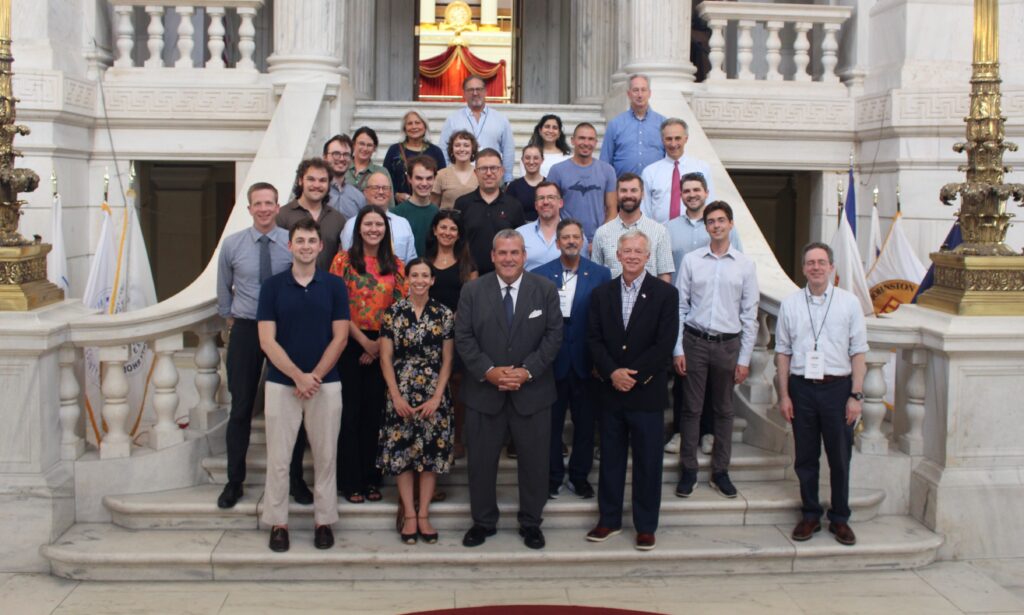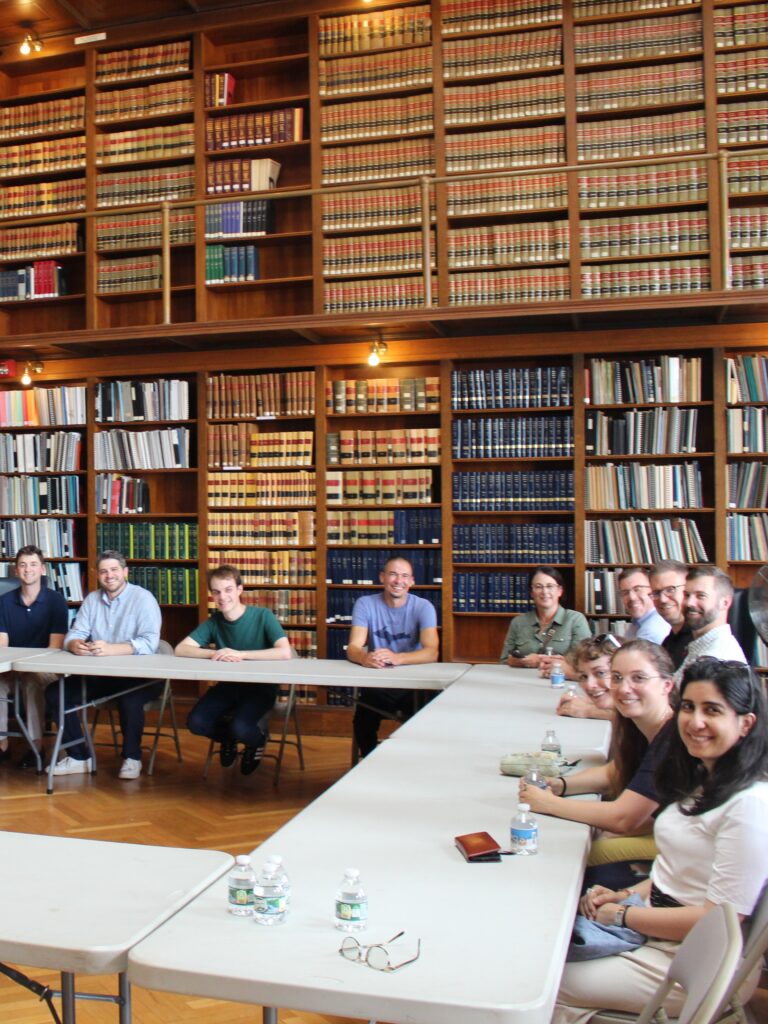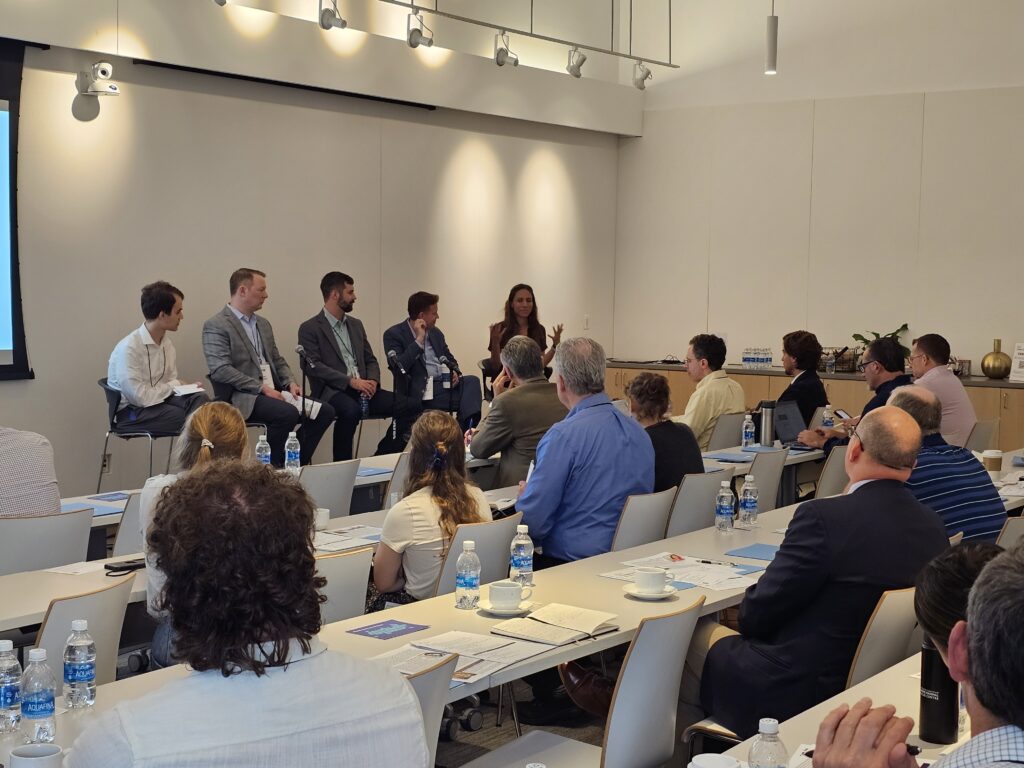
Established in 1914, the Governmental Research Association (GRA) is a national group of organizations and individuals professionally engaged in public policy, governmental, and civic research. In 2025, 35 member organizations or individuals in 17 states are part of the GRA, all studying the most important policy issues facing our municipalities, regions, and states.
In July, the Rhode Island Public Expenditure Council (RIPEC) hosted the annual conference in Providence, and experts from across the member organizations were joined by leaders from the Pew Charitable Trusts, the Lumina Foundation, Texas2036, the Lincoln Institute of Land Policy, the Tax Foundation, the State of Rhode Island, and several media organizations to discuss the state of local and state governments and policy in the face of unprecedented federal retrenchment.
Field trips to Newport and the Rhode Island capitol gave researchers both a delightful respite from the turgid heat and a window into the rich colonial history of the Ocean State.
This conference roundup includes the slides so you can use the information shared in your own work.
Opening Reception at CHOP
The GRA delegates were treated to amazing food and drink throughout the conference. We started off with a special reception at the Culinary Hub of Providence (CHOP), a mission-driven bar/café/restaurant run by the Genesis Center, a nonprofit that has helped “tens of thousands improve their English, gain employment, and achieve economic independence” through creating career pathways into the culinary arts. The artistry was definitely on display both behind the bar and in the kitchen, with crafty cocktails as well as upscale examples of Rhode Island delicacies like “stuffies” and pizza strips.
The conference also provided member organizations an opportunity to gain collective upskilling, to work in small groups based on roles (presidents, researchers, and operations), and to celebrate each other’s leadership and work with annual awards.


Day One – July 14
Social Factors of Academic Success Framework Provides New Tool
Dr. Phyllis Resnick, Chief Economist of the Colorado Futures Center, kicked off the first day of the conference by presenting her sophisticated Colorado Equity Platform, which identifies social factors most highly associated with student success, particularly the social factors that impact 3rd grade reading levels, because “third grade is when the transition happens from learning to read to reading to learn,” said Resnick. Her model, which crunches more than 60 variables across the diverse state of Colorado, identified a few crucial variables, such as student churn – related to Colorado’s imminent housing affordability crisis – as immediately actionable. Interestingly, her research also identified what she calls a “despair” index, noting that objectively many Coloradans are experiencing tangibly improving conditions, yet feel as if their lives are getting worse. Resnick noted that this index could be adapted and applied to other states and regions seeking to identify both rapid and longer-term interventions to move the needle on academic success.
College and Career Readiness
Aligned with national conversations about the return on investment from money spent on post-secondary education, the next panel dove deep into state-level research from very different states such as Texas, Rhode Island, and Indiana, framed by the notion on “credentials of value” out of the Lumina Foundation. The State of Rhode Island’s Prepare RI program aims to align needs of employers with career and technical education, with the state mandating that work-based learning be recognized by school districts as academic learning, with a goal of 100% participation in at least one CTE course by RI public school students. On the other end of the spectrum, the State of Texas graduates 350,000 students annually, and research by Texas2036 notes that while two-thirds of jobs in the Lone Star State require some form of post-secondary training, only 36% of Texans currently have such a credential. This is prompting Texas to invest heavily in its 50 community college systems across the huge state. In Indiana, as Indiana Fiscal Policy Institute CEO Stephanie Wells noted, local philanthropy is driving a pilot in ‘Swiss-style’ apprenticeships in the Hoosier State. While this is a promising shift, she also noted that many if not most employers, especially smaller firms, don’t have internal capacity to take on interns, and many shy away from employing youth due to liability considerations. Wrapping up this informative panel, Kermit Kaleba of the Lumina Foundation started his presentation with a startling graph showing the plummeting public perception of higher education in the past decade, probably tied to narratives around student loan debt as well as a broader assault on ‘educated elites’ that has become central to political discourse in recent years. While research still shows robust economic benefits to attainment of higher education credentials, Lumina has shifted to the language of “credentials of value” – any post-secondary certification that produces earnings that are at least 15% above a simple HS diploma – and has set a new stretch goal of 60% of adults holding such a COV by 2030.
Uncertainty in Federal Funding
Not to ignore the major elephant in everyone’s room these days, panelists Doug Howgate (MA Taxpayers Foundation), Brian Daniles (RI Office of Management & Budget), Liz Farmer (Pew Charitable Trusts), and Brian Straessle (Sycamore Institute) provided a comprehensive overview of how the Trump Administration’s multi-pronged retrenchment in federal funding will affect state budgets in particular. Howgate noted that despite strong state tax receivables and a large surplus, the Commonwealth of Massachusetts gets $16 billion from D.C. in Medicaid and its knowledge-based, eds-and-meds-centric economy is particularly sensitive to cuts in federal research funding, none of which can really be replaced by either state or private sources. Daniels echoed Howgate in noting the impossibility of backfilling with state resources, especially when the Ocean State’s Medicaid deficit is projected at $300 million in the next year; the RI governor’s office is particularly concerned with the radical pullback in funding for renewable energy, which will likely have a catastrophic impact on RI’s nascent ‘blue economy’ of offshore wind and marine tech. Farmer brought things down to the local level by discussing Pew research on the impact of SNAP cuts – which not only support the needs of low-income Americans but also act as revenue streams for grocery stores in lower-income neighborhoods. She noted that only half of states had already enacted budgets thus far and that this was the most fraught budget season in decades. She implored GRA organizations to get out there and explain to our constituencies what “the government” does with tax dollars and to use our reputation as trusted ‘meaning-makers and way-finders’ to attempt to counteract the prevalent anti-government sentiment. Finally, Straessle asked how states will cope with the end of the Department of Education as we know it, and cited Sycamore’s (excellent) work on “federal revenue dependency” and urged us all to perform risk analyses that can underpin scenario plans.
Communication is Key!
Next up, a panel of communications experts, including two working journalists, Janine Weisman of the Rhode Island Current and Dan McGowan of the Boston Globe’s Rhode Island bureau, as well as communications consultant Lauren Greene of New Harbor Group discussed ways in which GRA organizations can leverage their decades of well-earned trust to help bring resources to reporters seeking to write data-driven stories on the impact of federal, state, and local budgets on communities.
GRA Councils Share Ideas and Angst
Over a delicious lunch provided by our hosts at Johnson & Wales University’s culinary program, the GRA’s three Councils – Executives, Researchers, and Operations/Communications – met independently to discuss their respective jobs. The Executives discussed ways that GRA organizations might leverage each other’s resources, either through lending or ‘renting’ staff with particular skills to fellow GRA orgs, executing joint research projects or grant applications, or creating standard templates that might be replicated across states or municipalities. The Researchers discussed current areas of research and skill development as well as ideas for meetings in the coming year.
And we had fun too! Scenes from our Newport Excursion
Living up to its nickname as the Ocean State, no trip to RI would be complete without hopping on a boat. Blessed with perfect weather, after an intense morning of intellectual work, we hopped a ferry from Providence to Newport, one of the nation’s oldest port cities, incredibly rich with history. As the first colony built on religious tolerance, Newport is replete with houses of worship of nearly every denomination. As a Jew, I was humbled to get a view of the 17th century Touro Synagogue, a simple but majestic structure nestled up against some magnificent churches. The excursion ended with a lovely reception at the Landing on Bowen’s Wharf, with lively conversation and great drinks.




Day Two – July 15
AI and Research
GRA Day 2 kicked off bright and early with a lovely breakfast at JWU and a thought-provoking discussion of the role of artificial intelligence, particularly the burgeoning Large Language Model platforms like ChatGPT and Claude, led by my Economy League of Greater Philadelphia colleague, Saloni Tandon. She noted that AI at present is probably best conceived as a very hard-working intern that needs to be trained to do what we do. It is essentially capable of quickly combing through and synthesizing huge amounts of web-based information, and of course, is only somewhat capable of sifting out the chaff from the wheat, so to speak, which is where the need for experts to guide and train the LLMs becomes incredibly important. Tandon said that at present she uses AI to formulate research questions, conduct literature reviews, develop research methods, and produce charts and graphs and other data visualizations. But she cautioned that she spends a fair amount of time creating elaborate prompts that train the LLM to reduce the probability that it makes stuff up (aka ‘hallucinate’) and to minimize the bias built into many algorithms; in other words, its work still needs to be scrutinized. I left the panel more convinced that AI can be useful, but that its ‘intelligence’ is truly ‘artificial,’ at least at the present moment.
Member Engagement
As part of the GRA’s commitment to sharing skills and learning about not just the policy work of our organizations, but also the ways in which we run our shops, we asked MA Taxpayers Foundation to share the ways in which they have built their membership base considerably in recent years, adding 118 new members in the past 5 years. Starting with research about why companies – the main membership base for MTF as it is for many GRA orgs – join organizations, they developed a sophisticated strategy for growing their base. MTF knows the importance of retaining current members, which MTF now does at about an 84% annual rate. This requires really knowing what your current members want from the organization, using them as ambassadors to meet knew members, and offering exclusive programming to recruit members. MTF has had great success doing larger annual budget briefings and events designed to highlight MTF research, developing research agendas in conjunction with members, using partnerships effectively, and getting CEO Doug Howgate out into the business community regularly, particularly to discuss MTF’s respected Massachusetts Competitiveness Index – an idea we can all steal and replicate in our respective jurisdictions. Finally, in terms of attracting new members, MTF has created a value proposition of ‘scarcity’ by conducting smaller, limited-registration events open only to members and invited guests.
The Value of Indices
With MTF’s Competitiveness Index top of mind, the next panel segued smoothly into a discussion of the value of indices, with panelists from the Utah Foundation, the Citizens Research Council of Michigan, and the Tax Foundation. Rankings, all agreed, are good PR, hence the proliferation of “best of” and “top 30 under 30” lists. But as serious research organizations, it is incumbent upon GRA affiliates to go beyond a simple sound bite and produce indices of substance that illuminate and provide policymakers a useful tool. On the broader end of the spectrum, the Utah Foundation’s Social Capital Index is a sophisticated and replicable tool that ranks Utah’s counties based on a variety of variables that add up to the ability to live a dignified life, while the CRC’s Michigan Road Condition Index drilled down deep to examine the relationship between road conditions and funding.
K-12 Education Funding
The next panel featured a robust discussion about the ways in which states and localities are tackling K-12 education funding in a very uncertain federal environment. Kim Rueben of the Lincoln Institute of Land Policy provided national context, noting the enormous variability in public funding for education, ranging from $9,000 to $26,000 per student depending upon the state. She noted the tradeoffs between local funding, primarily rooted in property taxes which is stable and efficient though it perpetuates inequity, and state funding, which is often focused on fairness and equity though less predictable in many states. In Connecticut, according to Lisa Hammersley of the CT School Finance Project, local spending averages 57% of total spend, but there is a huge gap between the wealthiest communities and the poorest – which means that property tax rates in wealthy municipalities with high-value tax bases is often a fraction of the rates in poorer communities, perpetuating inequity. On the opposite end of the spectrum, the State of Alabama generates the lowest rate of property tax revenue per capita in the US, in part because 70% of land in AL is timber and it is not taxed until the timber is harvested. This has meant limited property tax resources for the 139 school systems in Alabama, leading to discussions of resource-based versus student-based funding models.
Providence Mayor Brett Smiley Joins GRA for Lunch!
During another delicious JWU-provided lunch, we were honored to host Providence Mayor Brett Smiley, who was interviewed by RIPEC Executive Director Mike DiBiase. He made a persuasive case for the renaissance of the medium-sized city, with many cities in Providence’s class of 200-500,000 residents experiencing population and investment gains. Like many other east coast cities, PVD lost 25% of its population after peaking in the 1940s, but due to a robust eds-and-meds economy, combined with immigration, has climbed its way back. The city is seeking to address housing affordability issues and create a more vibrant, dense, and safe downtown by converting Class B office buildings to residential. Smiley noted some innovative initiatives such as equipping EMTs with bikes so they can quietly and efficiently deal with the city’s populations experiencing homelessness or mental health crisis. Like many other urban mayors, Smiley is concerned about the threat posed by both ICE raids and the assault on higher education by the current administration, since they have been the pillars of Providence’s renaissance.

GRA Visits the Rhode Island Capitol
Thanks to RIPEC’s strong relationships in the Rhode Island statehouse, the entire group had the privilege of touring the capitol building and meeting with the current Secretary of State, Gregg Amore, who gave us a primer on ballot auditing in the spectacular capitol library. We also got a glimpse of the original charter of the colony of Rhode Island and a very informative description of the incredible imagery on the impressive capitol dome.




The GRA Awards Banquet
Aside from networking with and learning from our peers, the highlight of every GRA conference is the Awards Banquet, at which we honor our colleagues’ work in the field of governmental research, spend quality time together, and hear from an interesting local policy specialist. This year was a standout in all three realms.
First, Professor Corey Brettschneider of Brown University gave an incredibly interesting and provocative talk based on his latest book, The Presidents and the People: Five Leaders Who Threatened Democracy and the Citizens Who Fought to Defend It. Brettschneider analyzed the ways in which five presidents – Adams, Buchanan, A. Johnson, Wilson, and Nixon – utilized what Patrick Henry had warned were the ‘authoritarian’ aspects of the U.S. Constitution to undermine democracy, and that only organized citizen action reset the republic on its more democratic path. As one might imagine at this moment of the primacy of the ‘unitary executive’ theory, invocation of the Alien and Sedition Acts, and numerous court cases testing the limits of presidential versus congressional authority, Brettschneider’s talk sparked a lively conversation that probably could have lasted all night. (For those who want more, please check out Brettschneider’s podcast, The Oath and the Office.)
Capping the evening, this year the Awards Committee chose two exemplars of our field, Rob Hencken of the Wisconsin Policy Forum and Elaine Beattie of the Boston Municipal Research Bureau for the GRA’s highest individual honor, the Frederick P. Gruenberg Award for Lifetime Achievement. Our two winners had more than 7 decades of combined service to the field and both gave moving speeches about how working at their respective organizations had shaped their lives and careers.


And last but certainly not least, the subcommittees issued awards in the following categories:
- Most Distinguished Research award was presented to Citizens Research Council of Michigan for its report, A Data-Driven Assessment of Michigan’s Road Program. It took an innovative approach to reviewing the adequacy of Michigan’s road funding levels, as well as investigating options to improve road infrastructure quality–at any given level of funding–by highlighting potential inefficiencies of the statewide road program.
- Most Effective Education award was presented to the Wisconsin Policy Forum for its series of reports on Milwaukee’s K-12 educational landscape and potential opportunities to strengthen it. The reports included Roll Call: A Landscape Review of the Students, Financing, and Performance of Milwaukee’s K-12 Schools and Raising the Bar: Local and National Lessons for Milwaukee’s K-12 Schools.
- In addition, a Certificate of Merit was presented to the Bureau of Governmental Research for its report, How Has ‘Fair Share’ Fared? The Impact of the 2019 Deal to Increase Tourism Taxes for New Orleans Infrastructure. This report informed the public about the implementation and outcomes of tourism taxes to maintain streets, drainage and other infrastructure in New Orleans.
- Outstanding Policy Achievement: the GRA presented awards for state and local governmental issues.
- Outstanding Policy Achievement: State Governmental Issue went to the Massachusetts Taxpayers Foundation for its project, Strengthening Early Education and Child Care Policy in Massachusetts. The organization’s work included two reports on early education and child care policy in Massachusetts that have contributed to continued funding and codification of the Commonwealth Cares for Children (C3) grant program and tangible improvements to the effectiveness and efficiency of the Child Care Financial Assistance (CCFA) program.
- Outstanding Policy Achievement: Local Governmental Issue was given to the Bureau of Governmental Research for its efforts to encourage the City of New Orleans to meet the criteria for issuing $468 million in tax-exempt municipal bonds as opposed to taxable bonds, which carry higher interest rates. This will save property taxpayers an estimated $88.5 million over the bonds’ 30-year lifespan.
- Communications: The GRA honored outstanding short-form writing and digital communications by its members.
- Best Short-Form Writing was presented to the Rhode Island Public Expenditure Council for its op-ed column in The Boston Globe, “Can Providence more fairly balance property taxes among resident homeowners, businesses, landlords and renters?”
- A Certificate of Merit for Best Short-Form Writing was given to the Bureau of Governmental Research for its issue brief, Jailbreak Should Spur Sheriff and City to Tackle Jail’s Needs.
- Best Digital Communication went to The Sycamore Institute for two interactive dashboards it created relative to federal funding for the State of Tennessee and its counties and federal safety net enrollment and expenditure data.
- A Certificate of Merit for Best Digital Communication was presented to the Worcester Regional Research Bureau for the interactive map dashboard of the top 10 requests to the city’s 311 system in 2024 as part of the analysis, Where are Worcester’s Woes?
Annual Board Meeting
The annual in-person GRA Board meeting was held on the final morning of the conference. Starting with a few remarks by President Jeff Hornstein on the general state of the GRA and our need to work more closely together in these challenging times, we heard from Treasurer Phyllis Resnick about the evolving state of the organization’s financial record-keeping before immediate past president, and nominating committee chair Shawn Teigen presented the slate of trustee and officer nominees and called for votes on each. The election results are as follows:
- President – Jeff Hornstein, Economy League of Greater Philadelphia
- Vice President – Ryan Hankins, Public Affairs Research Council of Alabama
- Treasurer – Phyllis Resnick, Colorado Futures Center
- Secretary – Stephen Stuart, Bureau of Governmental Research
- Trustees (serving until the 2028 annual meeting):
- Melinda Deslatte, Public Affairs Research Council of Louisiana
- Justine Oliva, Rhode Island Public Expenditure Council
- Sara Shaw, Wisconsin Policy Forum
- Doug Howgate, Massachusetts Taxpayers Foundation
In Sum – Another Great Conference is in the Books!

